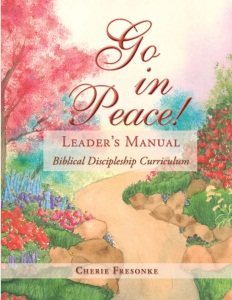Practical Advice
by Cherie Fresonke @cheriefresonke
Do you have a heart to disciple the hurting? Are people always coming to you to share their burdens, but you feel inadequate? Below are 4 easy steps that can point you in the right direction. But first, let’s talk about what may be holding you back.
[ctt template=”8″ link=”rbage” via=”yes” ]4 easy steps to help heal the brokenhearted. [/ctt]
Many times two issues that are preventing us from ministering to the hurting are: (1) we don’t know what to say, and (2) we think we don’t know enough of God’s Word to be effective.
If you’ve ever struggled with these thoughts, know that you are right where God wants you to be. Even I, after twenty plus years as a biblical lay counselor, wonder what to say to a hurting person as they share their struggle with me. So if you are like me, what do you do?
Step 1. Think Before You Speak
This is one of the most important steps in being an effective discipler. Many times, especially when we are nervous, we speak without thinking.
For example, don’t say you understand a person’s problem, if you’ve NEVER experienced the same issue before. Don’t tell a person who has been raped, or lost a baby, or been abused that you understand, if you’ve never gone through the same issue. Because in truth, you don’t understand. Instead it’s better to say, “I’ve never gone through what you’ve gone through. But I’ve had my share of trials and this is what I’ve learned . . .
Second Corinthians 1:3-4 says:
Praise be to the God and Father of our Lord Jesus Christ, the Father of compassion and the God of all comfort, who comforts us in all our troubles, so that we can comfort those in any trouble with the comfort we ourselves have received from God.
–NIV84, emphasis added
So although we may not have experienced the same issues as those we are hoping to help, we can minister to them.
I remember thinking back in my early days of discipling that I was only called to help those who struggled with the same issues I had struggled with. But then one day a woman came to see me. She had a difficult marriage. She wanted help. Yet my thoughts were: How could I possibly help her? I haven’t gone through what she’s gone through. I have a good marriage.
That’s when the Lord impressed upon my heart: You can’t. But I can. Comfort her with the same comfort you’ve received from Me in other areas of your life.
We all struggle. We all have trials and tribulations. And if we are running to God in the midst of the trials, He comforts our hearts. He teaches us. He helps us to grow and mature. He encourages us to hold fast. These are the truths we teach those that the Lord brings our way.
But how do we effectively accomplish this?
Think before you speak. Listen to them as they share. Don’t think about what to say. Remember, this discipling appointment is not about you. It’s all about Christ. And while you’re listening—pray. Pray for the words God wants you to share. This brings us to the next practically step in biblical discipleship.
Step 2. Utter Worthy Words
Many times in my ministering to others, while a person is sharing with me their struggles, I think, “Wow, their spouse is a jerk. Why is she staying with this guy?” (I’m just being honest here.) But it’s important for me to remember that it is not my words or my opinions that can help a person. In fact, my words and opinions will more than likely lead the person astray. Plus, there are always two sides to every story. Usually, you are only hearing one side. Think about it. If the jerky husband shared his side of the story with me, I probably would think differently about the wife. And I might even think that the jerky husband is a really nice guy.
So we can’t rely on our opinions, and we especially can’t share them. You see, it’s God and His Word that have the power to set a person free. Not us.
The middle part of Jeremiah 15:19 says:
if you utter worthy, not worthless, words, you will be my spokesman.
—NIV84
Worthy words are any words that come from God’s Word. In contrast, worthless words are derived from our own opinions, thinking and advice. (Just like my thoughts above about the jerky spouse.) Therefore, as you’re listening to what a person is saying, taking the time to think before you speak, and praying for exactly what words should be spoken, you will be amazed at how God can and will equip you.
So what do I do in a practical way as I’m ministering to a hurting person?
When a person first comes to see me concerning a trial in their life, I listen, I pray, and I wait. I wait until a verse or a biblical concept comes my way. I don’t have the whole Bible memorized, not even close. But I do take time to read it. And so I have a lot of biblical concepts memorized, and I guess, so do you. This brings us to step three.
Step 3. Tap into the Source of Wisdom
Keep your mouth zipped tight and pray until you hear from God. Psalm chapter 1 teaches:
Blessed is the man who walks not in the counsel of the wicked, nor stands in the way of sinners, nor sits in the seat of scoffers; but his delight is in the law of the LORD, and on his law he mediates day and night. He is like a tree planted by streams of water that yields its fruit in its season, and its leaf does not wither. In all that he does, he prospers.
—verses 1-3, ESV
God knows the answers for the one who is hurting. Although you might feel ill-equipped to minister to them, do not turn to the world’s way of thinking. So many want to run to talk shows, pop-psychology or refer the person to someone else, but in such cases they may be walking right in to the counsel of the wicked.
Instead, since God brought the person to you, tap into the source of wisdom. God has an answer in all situations. And He has an answer for you to share, if you are discipling a wounded child of His.
I remember once a lady came to see me that I thought was totally beyond my help. She seemed schizophrenic and I’m sure the world would have classified her so. But as I prayed and asked God what to do, He impressed upon my heart to take her slowly through the Go in Peace Biblical Discipleship Curriculum, page by page, lovingly making sure she understood each biblical concept.
Do you know what happened? The layers of fear that were surrounding her heart began to peel away. As she learned how to run to God instead of focusing on what frightened her (see Isaiah 26:3), she was set free. She changed before my eyes. I worked with her for about a year. She even joined a ministry, which would go out on the streets of Los Angeles to minister to prostitutes. Talk about overcoming fear.
So don’t immediately get ready to turn the person over to the world’s way of thinking. Instead, tap into the source of wisdom in how to disciple the hurting. Be a part of God’s Word to heal the brokenhearted. It will bless your socks off. I guarantee it.

What do you mean Grandma? People don’t always get it. That’s why it’s important to teach application.
Step 4. Teach Application
When the Lord impresses a verse or a biblical concept upon your heart to share with the person, don’t just toss scripture at them. Teach them what that verse or concept means. Plus take the time to share a real life example so you can teach the person application.
[ctt template=”8″ link=”6HVv1″ via=”yes” ]Don’t just toss scripture hoping it will be caught–teach application[/ctt]
Let me share an example of what I’m talking about. Once I met with a woman who was ragging on her husband. All she kept saying was how terrible he was. The whole time she was talking I just kept praying and asking the Lord what to say to this woman. How can I help her?
The Lord impressed upon my heart Philippians 4:8
Finally, brothers, whatever is true, whatever is honorable, whatever is just, whatever is pure, whatever is lovely, whatever is commendable, if there is any excellence, if there is anything worthy of praise, think about these things.
—ESV
So before I shared the verse with her, I asked her, “Tell me one good thing about your husband.” She looked at me as if I had grown two heads. I’m sure she was thinking, “Haven’t you heard a word I’ve been saying?”
She insisted there was nothing good about him.
I said, “Come on now. You married him. Why? What did you see in him that was good? There’s got to be at least one thing.”
She thought for a while and eventually said, “Well, he’s a good dad.”
Wonderful. Now we’ve got something we can work with. I shared the verse in Philippians with her. I told her anytime she began to think negative thoughts about her husband to change her thinking. Instead, think that one good thought of him. He’s a good father.
Plus, I gave her an assignment for the week. Before our meeting next week she needed to be ready to share with me two more good things about her husband.
Do you know what happened?
She fell in love with her husband again.
That’s application. That’s teaching someone how to apply God’s Word to their life in a concrete, tangible way. If I had just thrown the verse at her, she may have not caught it.
Extra Bonus to Help Disciple the Hurting
In closing let me throw in an extra bonus. In fact, two. If you have a heart to disciple, but still feel like it’s scary, let me share with you a tool that can help. Take a peek at the Go in Peace Biblical Discipleship Curriculum. There is even a men’s edition. It’s easy to use. I even have some free training videos you can check out by clicking here. Just scroll down and find the Go in Peace Leadership Training videos. There are three of them.
Lastly, if you want a super, in-depth training course on biblical counseling check out bcfministries.org. When I first felt called to this ministry, this is where I got my original training to become a biblical lay counselor.
If you have any questions, please feel free to ask me. Plus, for those of you already in active ministry in helping the hurting, I’m sure my readers would love to hear any tidbits of advice you have to share.
Blessings to each of you as you serve the Lord. I’m looking forward to hearing from you.











